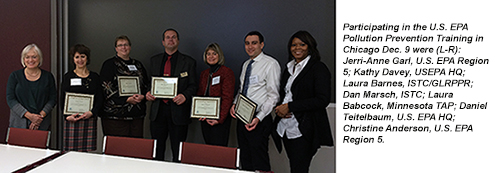With funding from the UI Office of Public Engagement, the Illinois Sustainable Technology Center (ISTC) is hosting a Sustainability Film Festival next week on the campus of the University of Illinois at Urbana-Champaign. Three documentaries will be screened at the Spurlock Museum‘s Knight Auditorium on the evenings of April 22, 23, and 24th from 6-7:30 PM: Living Downstream, Terra Blight, and Waste=Food, respectively.
Admission is FREE and open to the public on a first come, first served basis; doors open at 5:30 PM. After each film, a Q&A/discussion will be held with ISTC staff and other relevant campus and community experts. Panelists will answer questions about their organizations/programs, the issues dealt with in that evening’s film, and provide guidance for the audience on what they can do to prevent pollution, avoid exposure to and release of environmental toxins, and contribute to a cleaner environment in their own lives.
The Festival kicks off on Earth Day (April 22) with Living Downstream. Based on the acclaimed book by ecologist and cancer survivor Sandra Steingraber, Ph.D. This poetic film follows Sandra during one pivotal year as she travels across North America, working to break the silence about cancer and its environmental links. After a routine cancer screening, Sandra receives some worrying results and is thrust into a period of medical uncertainty. Thus, we begin two journeys with Sandra: her private struggles with cancer and her public quest to bring attention to the urgent human rights issue of cancer prevention. At once Sandra’s personal journey and her scientific exploration, Living Downstream is a powerful reminder of the intimate connection between the health of our bodies and the health of our air, land, and water.
On the evening of Wednesday, April 23, we’ll be screening Terra Blight. This 55-minute documentary explores America’s consumption of computers and the hazardous waste we create in pursuit of the latest technology. Terra Blight traces the life cycle of computers from creation to disposal and juxtaposes the disparate worlds that have computers as their center. From a 13-year-old Ghanaian who smashes obsolete monitors to salvage copper to a 3,000-person video game party in Texas, Terra Blight examines the unseen realities of one of the most ubiquitous toxic wastes on our planet. By the film’s end, the audience will never look at their computer the same way again.
Finally, on the evening of Thursday, April 24, we will show Waste=Food. In a world where more and more societies with high consumption rates generate excessive amounts of waste, traditional environmental notions of reducing or recycling waste products are no longer sufficient. The new theory of ecologically intelligent design, green design and building, argues that manufacturers’ products, when discarded, should either be completely recyclable in the Technosphere or become biodegradable food for the Biosphere. Waste = Food explores this revolutionary “cradle to cradle” (as opposed to “cradle to grave”) concept through interviews with its leading proponents, American architect William McDonough and German ecological chemist Michael Braungart, coauthors of Cradle to Cradle: Remaking the Way We Make Things. Their ideas are increasingly being embraced by major corporations and governments worldwide, unleashing a new, ecologically-inspired industrial revolution.
DVDs of the documentaries will be available after the film series at the Prairie Research Institute Library. The DVDs will have online activities and resource lists associated with them to enhance the educational impact of the films.
For more information, contact Joy Scrogum. We hope to see you at the movies!
 Why did Illinois pull the plug on the use of plastic microbeads as exfoliants? ISTC’s B.K. Sharma and Nancy Holm offer insights on the trouble with microbeads in the “A Minute With…” feature on the U of I website.
Why did Illinois pull the plug on the use of plastic microbeads as exfoliants? ISTC’s B.K. Sharma and Nancy Holm offer insights on the trouble with microbeads in the “A Minute With…” feature on the U of I website.





